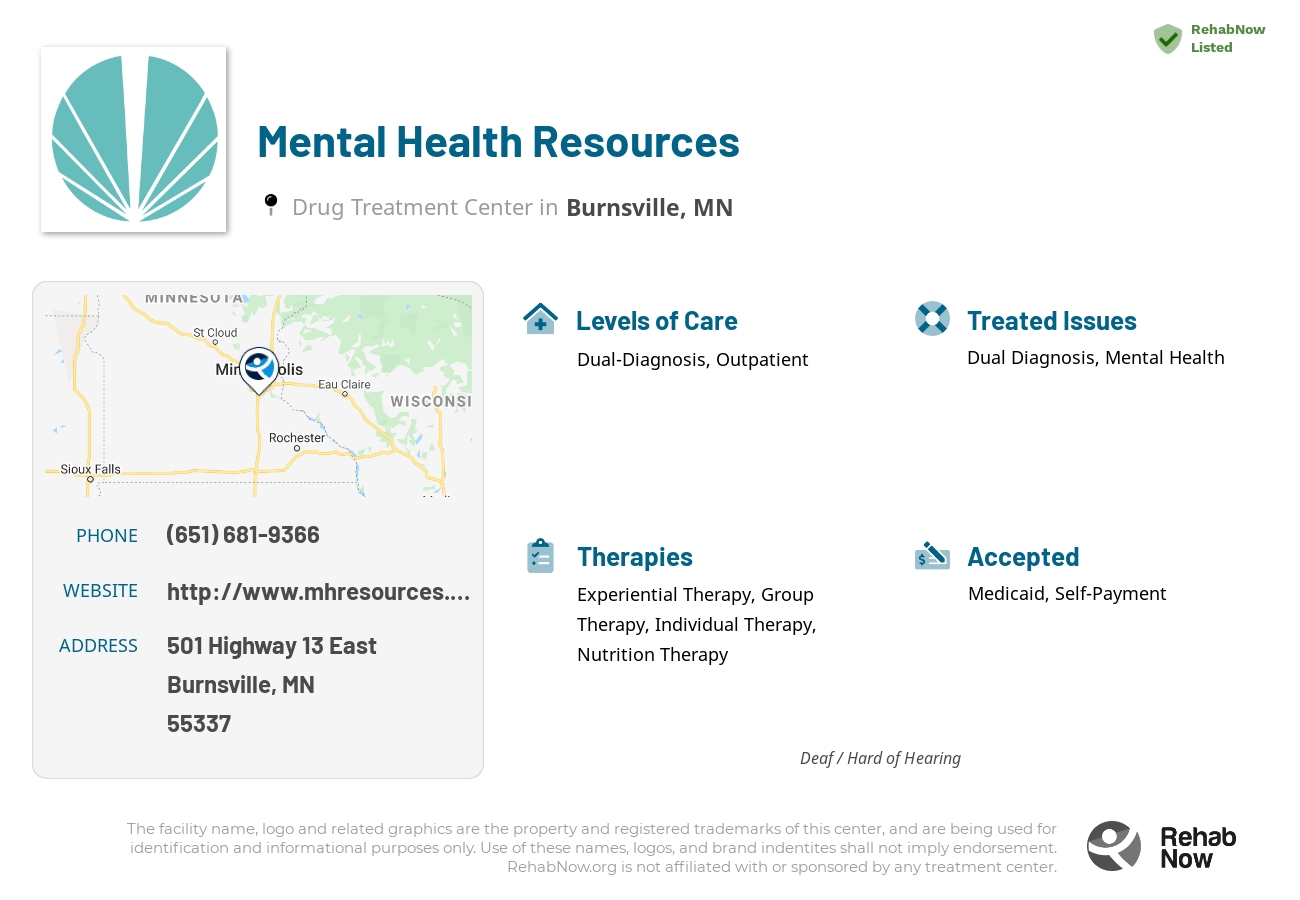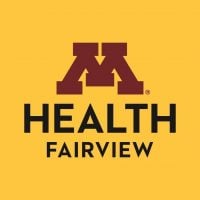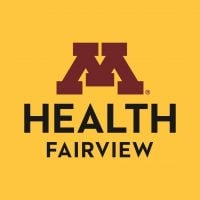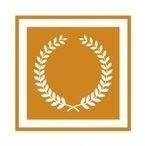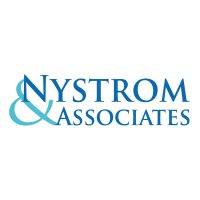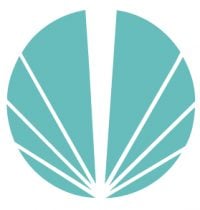
Mental Health Resources
Drug Rehab Center in Burnsville, Minnesota
- Mental Health
- Dual Diagnosis
Mental Health Resources in Burnsville, Minnesota is an addiction treatment facility that offers comprehensive services for individuals recovering from substance abuse and mental health issues, including specialized programs for dual diagnosis, mental health, alcoholism, drug addiction, and substance abuse, as well as medical detoxification, residential services, outpatient care, and relapse prevention support.
About Mental Health Resources in Minnesota
Mental Health Resources in Burnsville, Minnesota is an addiction treatment facility providing a comprehensive range of services aimed at helping individuals recover from substance abuse and mental health issues. It provides a variety of specialized programs for dual diagnosis, mental health, alcoholism, drug addiction, and substance abuse. Through individual and group therapy sessions, it aims to provide its clients with the necessary skills to overcome their addiction and the associated mental health issues. It also offers medical detoxification and residential services for people suffering from substance use disorder, in addition to outpatient care.
Mental Health Resources is an accredited and licensed facility that delivers specialized care following the highest quality of standards of care. They provide individualized treatment programs tailored to the specific needs of each client, offering evidence-based counseling, medication-assisted treatment, and other integrated services to help individuals identify and address the root cause of their addiction. Additionally, the facility places emphasis on relapse prevention and providing support to clients in their recovery journey, helping them maintain long-term sobriety.
Genders
Ages
Modality
Additional
Conditions and Issues Treated
Individuals who are addicted to drugs and/or alcohol often have one or more co-occurring mental health disorders. Addressing both the addiction and the mental health problems at facilities like Mental Health Resources can be very beneficial for these individuals.
Common mental health conditions that often co-occur with addiction include:
- Anxiety Disorders – People with drug and alcohol problems often suffer from anxiety disorders such as panic disorder, obsessive-compulsive disorder, social anxiety disorder, and generalized anxiety disorder.
- Depression – One of the most common mental illnesses co-occurring with addiction is major depressive disorder.
- Attention-deficit hyperactivity disorder (ADHD) – Many people with drug and alcohol problems also suffer from ADHD.
- Bipolar Disorder – People with bipolar disorder are more likely to suffer from drug and alcohol problems than the general population, and vice versa.
Levels of Care Offered
This center offers a variety of custom treatment tailored to individual recovery. Currently available are Dual-Diagnosis, Outpatient, with additional therapies available as listed below.
Outpatient treatment can be considered the lowest intensity level of addiction treatment in Burnsville, MN. It is ideal for early phase addiction or lower intensity addictions. Mental Health Resources peer group support, 12-step programs, and individual counseling are likely to be involved.
Therapies & Programs
Individual therapy is ideal for addicts who want to focus on themselves. It can also be helpful for those whose withdrawal symptoms are exacerbated by the presence of other people.
Benefits of individual therapy are:
- Access to a personalized treatment plan that focuses on the individual needs of the addict
- More privacy during treatment sessions
- Better personal development through introspection
- Increased self-awareness regarding addictive tendencies in order to avoid relapse
- Greater potential for a long-term recovery plan
- Receiving professional advice and detox assistance from medical staff
This is when a group of people in various stages of recovery meet up and discuss their experiences, triggers, successes, failures, and even alternative therapies! Unlike support groups where everyone already knows each other, group therapy is conducted along side outpatient or inpatient treatment at Mental Health Resources.
CBT is a psychotherapy approach and method. [ws-nap-name] people to examine how their thoughts, including habitual harmful and inaccurate thinking, affect their actions. CBT is based on the idea that rigid, inflexible thinking leads to poor stress management, which leads to emotional distress.
Similarly, CBT helps people identify and change negative behaviors. It makes you question your perceptions and ask if they are realistic. CBT asks people to examine their behaviors and emotional responses and how they affect their lives. CBT aims to change people’s thinking and behavior to lead a more balanced and healthy life.
Moreover, CBT has been shown to reduce anxiety disorders, depression, and symptoms associated with harmful thoughts or actions.
Nutrition therapy has been used to help drug addicts for decades. Many early reports on addiction treatment indicate that some patients recovered from the “satisfying power of food”. For years, this phenomenon has been utilized as a treatment modality in eating disorders for adults, adolescents, and children. Specific nutrients have been identified that influence neurotransmitters associated with reward pathways of the brain.
Studies have shown that carbohydrate loading with complex carbohydrates to elevate serotonin levels was effective in treating bulimia nervosa. This approach prompted researchers to explore the use of this type of nutritional intervention in other disorders.
Nicotine replacement therapy is a drug treatment that allows people to get the effects of nicotine without chewing or smoking. The therapy is often done with a patch, and doses of nicotine are reduced until nicotine is no longer needed. NRT helps smokers get nicotine into their system without resorting to smoking, and it has been shown to be an effective way to help people quit smoking. Coupling NRT with counseling and other means of support gives long-term smokers a better chance of removing their unhealthy habit.
Patient Experience
Experiential Therapy at Mental Health Resources
Experiential Therapy is a type of therapy that involves activity to recreate situations that may have caused trauma or negative emotions. Experiential therapy at Mental Health Resources in Burnsville, MN can involve acting, props, arts and crafts, animal care or other tools that may be effective. This therapy is done on an individual basis and can help revisit and heal from past traumas. Trust between the therapist and individual is important for success. Experiential therapy can help you more closely become you and move through life positively and authentically.
Payment Options Accepted
For specific insurance or payment methods please contact us.
Additional Details
Specifics, location, and helpful extra information.
Burnsville, Minnesota 55337 Phone Number(651) 681-9366 Meta DetailsUpdated November 25, 2023
Staff Verified
Mental Health Resources Patient Reviews
There are no reviews yet. Be the first one to write one.
Burnsville, Minnesota Addiction Information
Minnesota is fighting an opioid epidemic that is leaving hundreds of its residents dead each year. Both prescription opioids and illicit opioids are widely abused in the Land of 10,000 Lakes. Heroin continues to be one of the most commonly abused drugs in the state, if not the most common illicit drug. Over 10% of all treatment admissions in Minnesota list heroin as their drug of choice.
In 2012, there were 204,000 people addicted to an illicit drug in Burnsville, Minnesota. In 2013, 8,500 people died due to drug abuse in the state. Opioids were involved in 59% of all overdose deaths in 2016. The number of opioid-related deaths has increased by 137% since 2000. Drug treatment can be different depending on the person. Some people might like to attend group therapy sessions, while others prefer one-on-one therapy sessions.
Treatment in Nearby Cities
- Osseo, MN (24.3 mi.)
- Scandia, MN (39.7 mi.)
- Perham, MN (167.8 mi.)
- Ely, MN (226.1 mi.)
- Alexandria, MN (127.9 mi.)
Centers near Mental Health Resources
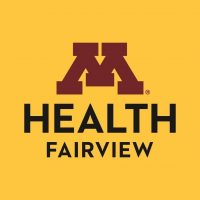

The facility name, logo and brand are the property and registered trademarks of Mental Health Resources, and are being used for identification and informational purposes only. Use of these names, logos and brands shall not imply endorsement. RehabNow.org is not affiliated with or sponsored by Mental Health Resources.

